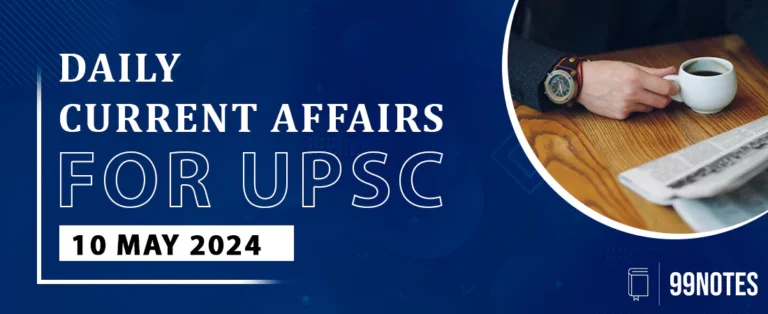12 Dec 2023 : Daily Current Affairs
Daily Current Affairs
12-December-2023
1. SC upholds repeal of J&K’s special status.
Topic: GS2 – Indian polity
Supreme Court Decision on Article 370:
- A Constitution Bench of the Supreme Court unanimously upheld the President’s power to abrogate the special status of Jammu and Kashmir under Article 370.
- The decision led to the reorganization of the full-fledged State into two Union Territories and the removal of its privileges.
Bench Composition:
- The five-judge Bench was headed by Chief Justice of India D.Y. Chandrachud.
Confirmation of Presidential Power:
- The court confirmed that the President has the authority to unilaterally issue a notification leading to the cessation of Article 370.
Special Circumstances and Unilateral Presidential Action:
- The court clarified that the President can exercise this power if special circumstances warrant a unique solution.
- It emphasized that the court cannot question the President’s decision on the existence of special circumstances justifying the abrogation.
Court’s Reasoning:
- Chief Justice D.Y. Chandrachud reasoned that the President’s decision in 2019 was the result of a gradual and collaborative exercise over 70 years between the Centre and the State.
- The objective of this exercise was to integrate Jammu and Kashmir with the Union.
Conclusion:
- The court’s unanimous decision affirms the constitutional validity of the President’s action in abrogating Article 370, leading to the reorganization of Jammu and Kashmir into Union Territories.
2. Centre blames traders for rise in onion price, says stir ‘sponsored’.
Topic: GS3 – retail inflation.
Context:
- Farmers and traders continue protests against the onion export ban in Maharashtra.
- Price Reduction:Consumer Affairs Ministry claims onion prices are decreasing in both retail and wholesale markets due to government intervention.
- Government Actions:
- Export ban on onions from December 8 to March 2024.
- Increased buffer stock to seven lakh tonnes.
- Procurement of onions from farmers through Price Stabilisation Fund.
- Justification:Government claims the ban was necessary to ensure domestic availability and prevent price rise above ₹100 per kg.
- Criticisms:Farmers’ protests are being dubbed “sponsored” by traders.
- Future:Government continues to monitor onion crop and prices, ready to take further actions if needed.
3. What are FSB’s concerns about crypto asset intermediaries?
Topic: GS3 – Indian economy.
What are multi-function crypto-asset intermediaries (MCIs)?
- Individual firms or groups offering multiple crypto-based services,products, and functions.
- Examples:Binance, Bitfinex,
- Different from traditional finance where functions are separated (prevents conflict of interest).
- Revenue source:transaction fees from trading self-issued crypto assets.
- Aims to become a “one-stop shop” for crypto-based services.
- Limited public information on revenue sources.
Transparency:
- Most MCIs are privately held and lack transparency about their corporate structure.
- Limited public disclosures,mostly specific to certain jurisdictions.
- Information primarily available through press coverage,court filings, and regulatory actions.
- MCIs fail to create separation between potentially conflicting business lines.
- Lack of clear account of transactions,activities, audit practices,
- Possible intentional attempt to limit understanding of vulnerabilities and evade regulatory oversight.
- Weak oversight parameters for risk management and governance frameworks.
- Poor risk management facilitates insider misconduct and magnifies vulnerabilities.
- Lack of transparency could hide risks from ineffective governance and lack of profitability.
- US SEC alleged Binance misled investors about risk controls and inflated trading volumes.
Spillovers:
- Present threat to global financial stability and real economy from MCI failure is limited.
- Recent failures of “crypto-asset-friendly” banks reveal concentrated deposit exposures to crypto-asset-reliant firms.
- Example:Silvergate Bank’s wind-down and liquidation due to FTX collapse and investor confidence loss.
Question: Assess the FSB’s findings on MCIs and their impact on financial stability. Recommend regulatory measures to address the identified shortcomings.
4. ‘Giving Article 370 permanent status will undo efforts to fully integrate J&K with the Union’
Topic: GS2 – Indian polity.
Key Points about the news:
- Article 370 aimed to enhance constitutional integration between J&K and the Union,not cause disintegration.
- Abrogation of Article 370 brought J&K on par with other states,applying the entire Indian Constitution.
- Argument that J&K would perpetually retain special status after 1957 rejected,as it would freeze integration.
- President not bound by Constituent Assembly’s recommendation,can issue notification without it.
- Continuous exercise of power under Article 370(1) indicates ongoing integration process.
- President’s declaration under Article 370(3) a valid exercise of power,culminating the integration process.
Overall:
The Supreme Court upholds the abrogation of Article 370 and justifies it as a necessary step towards full integration of J&K with the Union.
5. SC verdict has strengthened the spirit of Ek Bharat, Shreshtha Bharat’
Topic: GS2.
Overview:
- On December 11, the Supreme Court delivered a historic judgment affirming the abrogation of Articles 370 and 35(A) related to Jammu and Kashmir.
- The court upheld the sovereignty and integrity of India, emphasizing the decision’s purpose was to enhance constitutional integration, not disintegration.
Background and Context:
- Jammu, Kashmir, and Ladakh have faced violence and instability for seven decades.
- The confusion and duality in societal perspectives, stemming from economic and mental subjugation, affected the region’s development.
Development Initiatives:
- Post-2014, significant steps were taken to address developmental needs, including a special assistance package in 2015.
- Ministerial visits, sporting initiatives, and panchayat polls contributed to goodwill and democratic progress.
Impact of Abrogation – Four Years On:
- August 5, 2019, marked the abrogation of Articles 370 and 35(A), leading to comprehensive changes in Jammu, Kashmir, and Ladakh.
- The judicial verdict in December 2023 aligned with the positive transformation witnessed in the region.
Governance and Development Achievements:
- Grassroots democracy saw renewed faith, with wider representation, transparent governance, and improved indicators in healthcare and infrastructure.
- Central government schemes achieved saturation levels, covering all sections of society.
Infrastructure and Tourism Boost:
- The resilience of the people contributed to record growth, development, and tourist inflow.
- The Supreme Court’s verdict reinforced the spirit of Ek Bharat, Shreshtha Bharat, emphasizing unity and commitment to good governance.
Transformation and Positive Outlook:
- The verdict symbolizes a new beginning for the region, allowing every child born in Jammu, Kashmir, and Ladakh to paint a future full of vibrant aspirations.
- Development, democracy, and dignity have replaced disillusionment, disappointment, and despondency.
6. Citizenship Act: Not possible to collect accurate data of illegal immigrants, Govt tells SC
Topic: GS3- Internal Security
Context:
- The Supreme Court was notified by the Central Government that precise data regarding the number of illegal migrants living in different regions of the nation is not possible because such immigration is covert and clandestine.
- This statement was given in response to a court order requesting information regarding the approximate number of undocumented immigrants who entered Assam and other northeastern states after March 25, 1971.
Deportations and Citizenship Grants
- Union Home Secretary Ajay Bhalla’s declaration states that 14,346 foreign nationals were deported in total between 2017 and 2022 for offences such overstay, visa violations, and unauthorised entry.
- Additionally, according to the affidavit, 17,861 persons received citizenship between January 1, 1966, and March 25, 1971.
- Additionally, as of October 31, 2023, Foreigners Tribunals had designated 32,381 people who entered the nation within that same period as foreigners.
Border Fencing Challenges and Delays
- Details regarding the fencing of the border between Bangladesh and India were submitted in the affidavit.
- It was noted that West Bengal shares 2,216.7 km of the border, of which 78% is walled, leaving 435.504 km unfenced.
- It mentioned how the state government’s slower land purchase policy in West Bengal was causing delays in acquiring critical property, which in turn was impeding the execution of crucial national security projects like border fencing.
Multipronged Approach to Secure the Border
- The 4,096.7 km border between India and Bangladesh, which passes through West Bengal, Assam, Meghalaya, Mizoram, and Tripura, is a priority for the government.
- 3,922.243 km of this are thought to be suitable for fencing.
- According to the affidavit, 81.5% of the fence work has been finished in lengths that are practical, and technical fixes are being looked into for the remaining gaps that are not practical.
- In order to identify susceptible areas, the Border Security Force (BSF) is mapping the border. By September 2024, Low-Cost Technological Solutions (LCTS) are planned to have covered 281 kilometres of the border.
7. Govt decides to withdraw three criminal law Bills
Topic: Polity
Context:
- In order to provide fresh draft legislation that take the recommendations of the parliamentary panel into consideration, the Central Government has chosen to withdraw three new criminal law proposals from the Lok Sabha.
- A notable modification involves substituting the defence word “mental illness” with “unsound mind” in the Bhartiya Nyay Samhita (BNS) 2023, which is meant to supplant the Indian Penal Code (IPC).
- The change is intended to allay worries that the definition of “mental illness” is too wide and may include willful intoxication and mood swings.
Panel’s Recommendation on Terminology Change
- The Parliamentary panel recommended that “unsound mind” be used in place of “mental illness” in the BNS 2023.
- The committee contended that the wider definition might cause problems in court since an accused individual could blame illegal acts on drug or alcohol usage, perhaps avoiding punishment.
- This proposal is claimed to have been approved by the government, which acknowledged the necessity for a more exact legal definition.
Controversies Over Adultery and Section 377
- The government apparently approved the term change, but it declined requests to keep adultery as a crime in the BNS 2023.
- The parliamentary committee proposed a modified clause to address gender discrimination, voicing concerns about the necessity to protect the sanctity of marriage.
- The government, on the other hand, disapproved and decided not to make non-consensual sex between people illegal, even going so far as to reinstate Section 377 of the IPC.
Opposition’s Coordination and Demands
- Regarding these proposals as well as the Chief Election Commissioner and Other ECs (Appointment, Conditions of Service, and Term of Office) Bill, the opposition parties have made the decision to coordinate their floor approach in Parliament.
- Despite the three proposals having already been examined by the Parliamentary Standing Committee on Home Affairs, they intend to insist that they be submitted to a combined Select Committee.
- The administration might oppose the opposition’s demand.
Overview of the Introduced Bills
- Amit Shah, the Union Home Minister, proposed three legislation on August 11 that address different facets of criminal law.
- They introduce provisions for punishment ranging from incarceration to the death penalty, addressing situations like mob lynching.
- Additional features include the introduction of community service and solitary detention as new types of punishment, e-filing of FIRs, expanded definitions of sedition, and the inclusion of organised crime, terrorism, and corruption under criminal laws.
- The bills aim to make significant modifications to the legal system that oversees criminal offences.
8. “COP28 Stalemate: New Draft Agreement Sparks Concerns Over Fossil Fuel Measures and Coal Phase-Down”
Topic: GS3- Environment
Context:
- Following four days of impasse at the COP28 climate conference, a revised draft accord wording has emerged, significantly weakening previous clauses about the phase-out of fossil fuels.
- The European Union and some tiny island governments have already rejected the draft, despite the fact that it stresses a just and equal decrease in the production and consumption of fossil fuels.
- The negotiations may not conclude on Tuesday as planned due to the differences.
European Union’s Disapproval and Concerns
- Speaking on behalf of the EU, Teresa Ribera, Spain’s Minister for Ecological Transition, expressed unhappiness with the revised draft accord, calling certain sections completely unacceptable.
- These opinions were mirrored by the EU climate commissioner, who said that although the text has some good points, it falls short of adequately tackling the climate emergency.
Dilution of Fossil Fuel Elimination Provision
- One of the main points of controversy is the amended fossil fuel provision, which now instructs nations to “reduce both consumption and production of fossil fuels, in a just, orderly, and equitable manner.”
- This is a change from earlier COP resolutions that emphasised the need to cut emissions but did not outline specific steps to do so.
- Since there is growing demand to address the shortcomings of the present emission reduction efforts, the dilution is perceived as a compromise.
Retention of Coal Phase-Down, A Cause of Concern for India
- The draft accord kept a section addressing the phase-down of coal while weakening the one on fossil fuels.
- This clause adds further restrictions on the construction of new coal-fired power facilities.
- Concerns are raised by the continuation of this clause, especially for India, which has stated that it opposes coal being singled out for rapid reduction since it believes this to be discriminatory.
India’s Response and Redlines
- Although it hasn’t responded to Monday’s draft accord yet, India has always insisted that it is unfair to single out coal for quicker reduction.
- The nation has made a point of addressing climate change, but it is leery of policies that can get in the way of its development objectives.
- There will probably be more talks on these divisive topics during the current negotiations.
9. CBI, FBI discuss cooperation in tackling cyber crime
Topic: GS3- Internal Security
Context:
- Director of the Federal Bureau of Investigation (FBI), Christopher Wray, and Director of the Criminal Bureau of Investigation (CBI), Praveen Sood, held a one-hour meeting to talk about improving collaboration in financial crimes related to cyberspace and exchanging evidence to apprehend criminals and fugitives.
- The issues raised by ransomware threats, financial crimes enabled by cyberspace, organised criminal networks, economic crimes, and multinational crimes were discussed during the discussion, which took place at the CBI headquarters.
- In order to address these issues, both organisations realised that there was a need for greater collaboration and faster evidence exchange.
Focus Areas:
- The talks made clear how crucial it is to improve information sharing on criminal issues in order to enhance coordination in the fight against transnational crimes.
- Focus areas included economic crimes, ransomware threats, and financial crimes enabled by cyberspace.
- In order to effectively confront the changing problems in the digital realm, the meeting underscored the importance of exchanging experience in the investigation of crimes enabled by technology.
Exchange of Best Practices and Collaborative Initiatives
- The discussion also looked at ways that the CBI Academy in Ghaziabad and the FBI Academy in Quantico could share best practices.
- The two organisations reaffirmed their dedication to cooperative endeavours and emphasised the importance of global law enforcement collaboration in the fight against crime in all of its forms.
Recent Developments: Foiled Assassination Plot
- The meeting took place a few days after Indian citizens and an unidentified Indian official were charged by US federal prosecutors with being involved in an abortive attempt to kill Khalistan rebel Gurpatwant Singh Pannun on US soil.
- Wray will meet with senior representatives of Indian security and law enforcement agencies during his two-day visit to the nation’s capital.
Deepening Cooperation and Shared Commitment
- In the lengthy history of the FBI and CBI’s partnership, Director Wray conveyed his appreciation to the CBI for its cooperative nature and unwavering collaboration.
- The visit is regarded as an important step in strengthening collaboration and developing a common resolve to fight crime on a worldwide scale.
- Both organisations expressed hope for upcoming exchanges and cooperative projects.
10. “Supreme Court Unanimously Upholds Article 370 Abrogation: Key Legal Insights”
Topic: Polity
Context:
- By a vote of 5-0, the Supreme Court affirmed the Center’s revocation of Article 370 of the Constitution.
- Under the direction of Chief Justice D Y Chandrachud, the Constitution Bench upheld the constitutionality of two Presidential Orders, CO 272 and CO 273, issued on August 5 and 6, 2019, respectively.
- This means that Jammu and Kashmir is now covered by the entirety of the Indian Constitution, and Article 370 is no longer in effect.
Sovereignty of Jammu and Kashmir
- The claim that Jammu and Kashmir still possessed a portion of its sovereignty that set it apart from other princely states was discussed by the court.
- It emphasised Section 3 of the Jammu and Kashmir Constitution, which declares the region to be an essential component of India, and the fact that J&K is listed as a component III state in the Indian Constitution.
- The Indian Constitution’s adoption has the same impact, the court ruled, rejecting the idea that a merger agreement was required.
Article 370: Temporary or Permanent
- The court was asked to hear arguments regarding Article 370’s durability. Justice Kaul and the Chief Justice agreed that Article 370 was always meant to be a stopgap measure.
- Justice Kaul maintained that it was always temporary, but the Chief Justice stressed that it was only a temporary solution till the State’s Constituent Assembly was established.
Legality of Article 370 Abrogation
- By means of Presidential Orders CO 272 and CO 273, Article 367 was amended in order to legally revoke Article 370.
- Chief Justice Chandrachud asserted that the President could have simply revoked Article 370 without having to alter the meaning of the J&K Constituent Assembly, while Justice Kaul upheld this procedure.
Action Taken Under President’s Rule
- The court cited the 1994 Bommai decision in its consideration of the action taken while the President was in office, holding that the President’s actions during this time needed to be carefully examined for signs of malice or obvious irrationality.
- The court decided that the course of action should take into account necessity and advisability, and it should not conflict with the guidelines established in the Bommai case.
The unanimous decision addresses important points brought up during the challenge to the government’s decisions and clarifies the constitutional aspects surrounding the abrogation of Article 370.
For Enquiry

12 Dec 2023 : Daily Current Affairs

12 December 2023 : The Hindu Editorial Notes PDF

12 Dec 2023 : Indian Express

11 Dec 2023 : Daily Quiz

11 Dec 2023 : Daily Answer Writing

11 Dec 2023 : Indian Express

11 Dec 2023 : PIB

11 Dec 2023 : Daily Current Affairs

11 December 2023 : The Hindu Editorial Notes PDF

9 Dec 2023 : Daily Quiz
Daily Current Affairs 12 Dec 2023 : Daily Current Affairs Daily Current Affairs
12-December-2023
1. SC upholds repeal of J&K’s special status.
Topic: GS2…
December 2023 The Hindu 12 December 2023 : The Hindu Editorial Notes PDF The Hindu Editorial
12-December-2023
1. Harvest the Odisha story to ensure food security
Topic: GS3…
december 2023 indian express 12 Dec 2023 : Indian Express Indian Express
12- December-2023
1) A conjuring trick
Context:
The recent ruling by the Supreme Court…
Daily Quiz 11 Dec 2023 : Daily Quiz 11 Dec 2023 : Daily Quiz…
mains answer writing 11 Dec 2023 : Daily Answer Writing Mains Answer Writing
11-December-2023
1. Discuss the factors behind distribution of global palm oil…
december 2023 indian express 11 Dec 2023 : Indian Express Indian Express
11- December-2023
1) FLIGHT TO WELL BEING
Context:
A major tactic for women’s…
December 2023 Pib 11 Dec 2023 : PIB PRESS INFORMATION BUREAU
11-December -2023
1. Industry transition challenges of technology transfer…
Daily Current Affairs 11 Dec 2023 : Daily Current Affairs Daily Current Affairs
11-December-2023
1. Key COP document calls for progress in adapting to climate…
December 2023 The Hindu 11 December 2023 : The Hindu Editorial Notes PDF The Hindu Editorial
11-December-2023
1. Calibrating a strategy for India’s future growth.
Topic: GS2…
Daily Quiz 9 Dec 2023 : Daily Quiz 9 Dec 2023 : Daily Quiz…



